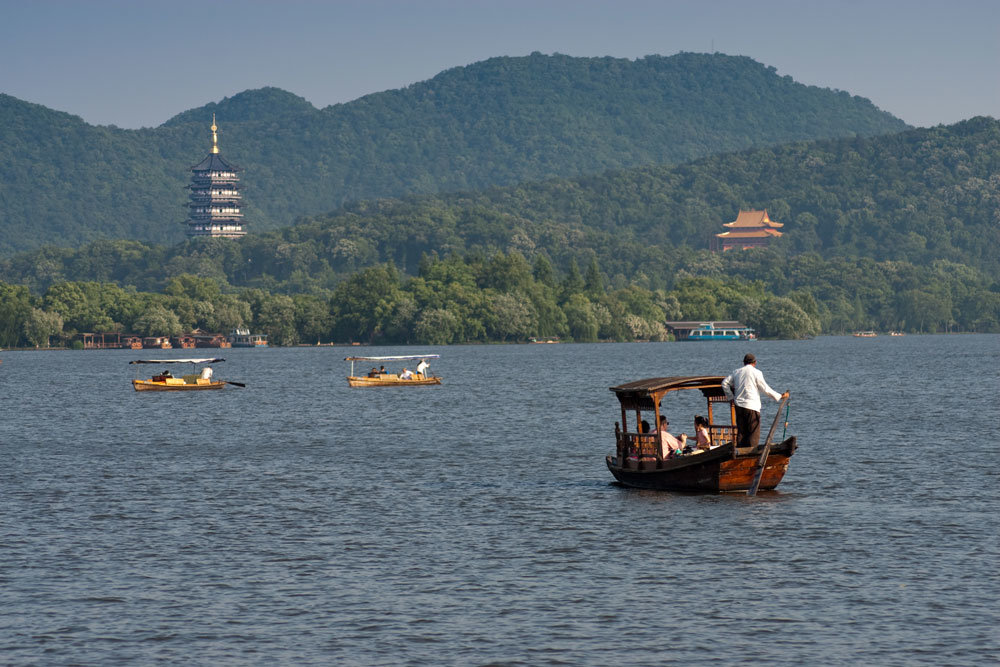Reasons why Hangzhou is called ‘heaven on earth’ by Chinese

HANGZHOU, China - In terms of natural scenery, Hangzhou, the capital of Zhejiang Province in southeast China, is a very beautiful city. Some consider it the most beautiful city in China.
In the modern day, which China has emerged as a fast growing economy, a climate of calm and tranquility still dominates the city of nine million people. It still retains its natural beauty and historical and cultural heritage.
The West Lake, a UNESCO World Heritage Site, is glowing like a pearl in the city. The city attracts large numbers tourists from inside and outside China. The lake is surrounded by forested hills on the northern and western sides. The Baochu Pagoda [also called the Leifeng Pagoda ] sits on the Baoshi Hill to the north of the lake.
Foreign and Chinese tourists, including vacationers from the distant province of Xinjiang in northwest China, visit the city and cruise the lake.
The New York Times has selected the city as one of the “41 places in the world worth visiting”. Also, the Oriental Outlook magazine has consistently rated Hangzhou at the top of the list of the 10 “happiest cities” in China.

Hangzhou has blended traditionalism and modernism. When one moves from Xiaoshan International
Airport to the city one sees residential houses which have beautifully combined traditional and modern architecture. Tall buildings and skyscrapers also feature high as one travels deep into the city.
Picturesque landscape, modernity, and openness to the world have made Hangzhou unique in China. China has selected Hangzhou as the venue of the G20 summit, which will be held on September 4-5 this year. In September 2015, Hangzhou was also awarded the 2022 Asian Games.
Being a tourist magnet has made the city richer as well. For example, in 2013 the local government said one in every three people in Hangzhou owned a car – the highest number among all other Chinese cities.
Hangzhou is blessed with impressive landscapes
Hangzhou is one of the seven ancient capitals of China. It is believed that Hangzhou was the largest city in the world from 1180 to 1315 and from 1348 to 1358.
Italian explorer Marco Polo, who supposedly visited Hangzhou in the late 13th century, described the city as the finest and most luxurious in the world. In his book, Marco Polo records that the city was “greater than any in the world”.
Also, the famous 14th-century Moroccan explorer Ibn Battuta said it was “the biggest city I have ever seen on the face of the earth.”
The city enjoys a unique geographical situation as well. Being at the southern terminus of the 1,776-kilometer-long Grand Canal (also known as the Beijing-Hangzhou Grand Canal), the city is located on the lower reaches of the Qiantang River in southeast China, a superior position in the Yangtze Delta.
It is also only 180 kilometers from Shanghai, which is considered the New York of China.
In terms of art, Hangzhou has also been a favorite among China’s landscape painters for a long time. The city is famous for its Chinese calligraphy and seal carvings, and is home to the country’s top art university, the China Academy of Art.
It was highly exciting to notice that tourists from Xinjiang communicating in their native language with reporters from Turkey and Central Asian republics.
Numerous philosophers, politicians, and men of literature, including some of the most celebrated poets in Chinese history such as Su Shi, Lu You, and Xin Qiji came here to live and die.
Hangzhou has also signed sister-city partnerships with Queenstown of New Zealand, Gifu of Japan, Boston of the United States, Leeds of England, Nice of France, Budapest of Hungary, Cape Town of South Africa, and Dresden of Germany among others.
After Deng Xiaoping’s reformist policies began in 1978, Hangzhou took advantage of being situated in the Yangtze River Delta to bolster its development. It is now one of China’s most prosperous major cities.

For example, Geely (officially called the Zhejiang Geely Holding Group Co) is a Chinese multinational automotive manufacturing company headquartered in Hangzhou. Its principal products are automobiles, taxis, motorcycles, engines, and transmissions. It sells passenger cars under the Geely and Volvo brands and taxis under the London Taxi brand.
The company, which has set ambitious targets to produce environmentally friendly cars in the coming years, has also found customers for its passenger cars in the Iranian market.
It is worth noting that Hangzhou is also considered “Silicon Valley” of China as Hangzhou Hi-Tech Industrial Development Zone was set up with approval from the State Council at a state level in 1991. Major companies such as Motorola, Nokia and Siemens
have established R&D centers in the zone.
According to internationalcenter.org, Xiaoshan International Airport is serviced by 27 international airlines. And since the beginning of 2016, the province has implemented a 144-hour visa-free transit policy which allows international travelers from 51 countries and regions to move around Zhejiang, Shanghai and Jiangsu provinces without holding the visa for six days.
Hangzhou has direct and frequent flights with major cities in China and also some international destinations, including Paris, Tokyo, Seoul, Singapore, and Bangkok. It is within the fast transport network of east China, and enjoys convenient high-speed rail and highway connection with popular tourist cities in this area, like Shanghai, Suzhou and Nanjing.
A combination of scenic beauty, infrastructures, economic development, and green economy - which has been declared as a policy priority by the Chinese government - constitutes the reasons to make Hangzhou more attractive and prosperous and keep its tile of the “heaven on earth” for the Chinese.
Leave a Comment